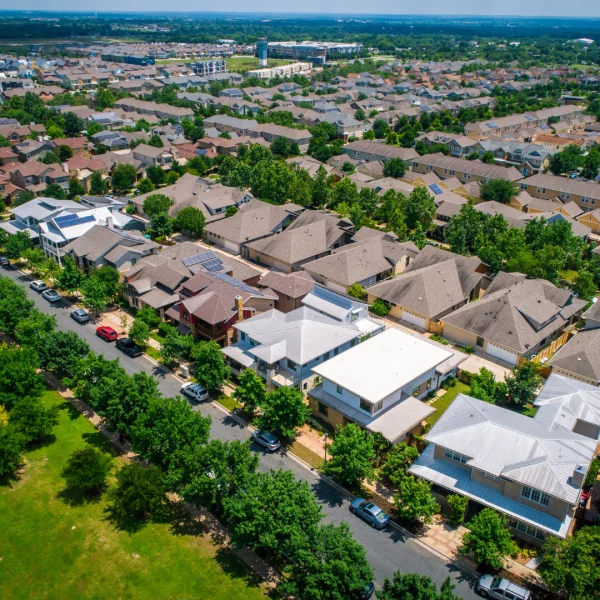Planting Seeds of Success: The Essentials of
Real Estate Farming
Have you ever come across the term “real estate farming” and puzzled over its connection to agriculture? In reality, this phrase isn’t about traditional farming but rather about nurturing potential in a specific neighborhood. This strategic approach holds the power to transform your real estate career if executed skillfully.
Envision yourself as a diligent gardener tending to your chosen plot – the neighborhood, or your ‘farm’. Here, you don’t cultivate crops, but relationships. You nurture your professional standing, and in due time, you harvest the fruits of your labor: a thriving business founded on trust and recognition.
But the question arises: how does one tend to this metaphorical garden without losing direction?
In this comprehensive article, we will guide you through the process, from selecting the right farm area to fostering community connections, implementing effective marketing strategies, and ultimately, measuring your success and navigating any challenges that arise.
Prepare for an enlightening journey. Your safety and success in this venture are paramount.
Table of contents
- Understanding Real Estate Farming
- Identifying Your Target Area in Real Estate Farming
- Engaging with the Community in Your Farm Area
- Marketing Strategies for Effective Real Estate Farming
- Nurturing Client Relationships in Real Estate Farming
- Measuring Success in Real Estate Farming
- Nurturing Client Relationships in Real Estate Farming
- FAQs About Real Estate Farming
- Conclusion

Understanding Real Estate Farming
Real estate farming is an effective strategy for expanding your real estate business, yet its concept often raises questions. Essentially, it involves focusing your marketing efforts on a designated area or neighborhood, akin to a farmer tending to a specific plot of land.
This targeted approach enables you to develop a deep understanding of the community’s unique characteristics and trends. As a realtor, this specialized knowledge equips you to meet client needs more precisely and anticipate their requirements with greater accuracy. Imagine yourself as a diligent farmer nurturing their crops, while also serving as a dependable advisor to homeowners navigating important life decisions.
Many successful realtors adopt this strategy, selecting a particular area as their ‘farm’. They then ‘sow’ their marketing efforts in various forms, effectively cultivating a strong presence and reputation in their chosen community.
The Benefits of Real Estate Farming
Real estate farming, when practiced effectively, offers a wealth of benefits. At its core, it involves focusing your efforts on a specific geographic area. This dedicated approach leads to increased referrals as local residents begin to recognize your name and associate it with property transactions in their community.
More than just local fame, farming provides you with a profound understanding of the market dynamics in your chosen area. This in-depth knowledge positions you ahead of competitors who may spread their efforts too thinly over various regions, failing to acquire deep insights into any particular one.
Critical Factors For Successful Farming
To farm effectively, consider several critical elements. Understanding the demographic makeup of residents, staying updated on current market conditions, being aware of prevalent property types, and even keeping an eye on future development plans are all crucial.
Deep Demographic Understanding: It’s vital to know the residents of your chosen area intimately. This includes age groups, income levels, family sizes, and lifestyle preferences. Tailoring your services to meet these specific characteristics can make a significant difference.
Staying Current with Market Conditions: Keeping a pulse on local real estate trends, such as pricing patterns, inventory levels, and buyer preferences, is crucial. This knowledge enables you to provide informed advice to clients and position yourself as a knowledgeable source in the community.
Knowledge of Property Types: Each community has its unique mix of property types, whether it’s single-family homes, condos, or townhouses. Understanding what’s available and in demand in your area helps in targeting your marketing efforts effectively.
Monitoring Future Developments: Being aware of planned developments or changes in infrastructure can give you an edge. This foresight helps in advising clients about potential opportunities or challenges in the future.
The essence of real estate farming lies not in casting a wide net but in immersing yourself deeply within a specific community, aiming to be the recognized expert. With the right blend of dedication and strategic planning, this approach can significantly elevate your career.
Identifying Your Target Area in Real Estate Farming
Selecting the perfect area for real estate farming is a lot like finally taking off a blindfold to hit a bullseye. Let’s guide you through this process to sharpen your focus and enhance your aim.
Getting to Know Your Neighbors:
It’s crucial to understand who you’re catering to. For instance, selling beach gear in a mountain town wouldn’t make much sense, right? Similarly, ensure the characteristics of your farm area align with the needs of your potential clients. While families might prioritize areas with reputable schools and safe playgrounds, young professionals could be looking for the hustle and bustle of city life. It’s all about finding the right fit.
Following the Market’s Lead:
Imagine market trends as your personal GPS to success. Utilizing resources like Zillow Research Data can be a game-changer. These tools help you track housing prices, buyer demand, and other patterns in various neighborhoods. It’s like having a map that shows where the treasure is buried.
Playing the Real Estate Game Smartly:
The real estate world can be as competitive as a championship sports match. If you’re considering an area that’s as crowded as a shopping mall on Black Friday, you might need to rethink your strategy. With tools like Realtor.com Agent Finder, you can scope out the competition. It’s about knowing who you’re playing against and what moves they’re making.
Your Secret Sauce – Personal Insights:
Sometimes, what sets you apart is your unique relationship with an area. Maybe you have childhood memories there or a web of contacts in a particular community. These personal connections can be your ace in the hole, like having a secret strategy in a complex board game.
So, remember, picking your real estate farming area is far from a wild guess. By carefully weighing demographics, market trends, competition, and your own special insights, you’re not just taking a chance – you’re making a smart, calculated move in the real estate world.
Engaging with the Community in Your Farm Area
In the realm of real estate farming, forging strong bonds within your target community is crucial. Think of it as tending a garden; the more attention and care you give to your plants (or relationships), the more robust and fruitful they become.
Getting Involved Locally:
A great way to start is by immersing yourself in community activities. Whether it’s participating in local festivals, supporting a school fundraiser, or sponsoring a little league team, these actions show that you’re invested in the area’s well-being, not just in business. According to insights from Realtor.com, these engagement strategies are key in building trust and rapport with community members.
Customizing Your Strategy:
Remember, one size doesn’t fit all. Your approach should be as unique as the community you’re serving. For instance, in some neighborhoods, hosting informative workshops on first-time home buying might resonate well, while in others, offering insights on investment properties could be more beneficial. Engaging in conversations at community events or conducting informal surveys at local spots can offer valuable insights into what the residents truly care about.
Being a Local Resource:
It’s essential to position yourself as more than just a realtor. Aim to be a valuable resource to the residents. Regular market updates, tips on property upkeep, or insights into local development plans can be shared through a monthly newsletter or a blog. Resources like HubSpot offer great tips on how to effectively communicate and provide value to your audience.
By genuinely caring for and contributing to the community, you’ll become more than a realtor; you’ll be a trusted member of the community. This deep-rooted trust is invaluable for successful real estate farming. Your aim is not just to facilitate property transactions but to be a supportive and knowledgeable figure in the local landscape.
Marketing Strategies for Effective Real Estate Farming
Your marketing tactics are the lifeblood of your real estate farming success. Mixing traditional methods with digital strategies can create a dynamic and effective campaign.
Traditional Marketing Methods:
Incorporating classic techniques is essential. For example, hosting open houses allows potential clients to experience properties firsthand and fosters community connections.
Pro Tip: Utilize digital tools like Open Home Pro for lead collection at open houses. This app gathers visitor information and assists in follow-up communications, increasing your chances of converting visitors into leads.
Don’t underestimate the power of printed newsletters or flyers. These can keep your area updated with local real estate news and listings. Partnering with local businesses for these distributions can be mutually beneficial, enhancing community ties.
Referral marketing is another cornerstone. Motivating your current clients to refer others by offering incentives, like a small discount on future services, can effectively expand your client base.
Digital Marketing Techniques:
In today’s digital world, a strong online presence is non-negotiable. Utilizing SEO to optimize your website, and engaging in targeted advertising on social media platforms can significantly broaden your reach.
Customized email campaigns are also powerful tools. Sending regular updates about properties, market insights, and buying or selling tips helps establish you as a knowledgeable resource. Just ensure your emails have clear calls-to-action directing recipients to your website or contact page.
Social Media Engagement:
Social media platforms are invaluable for visually showcasing listings and directly engaging with potential clients. By participating in local online groups, you can demonstrate your expertise and attract leads.
Consider using scheduling tools like Buffer or Hootsuite to keep your social media presence active and consistent, ensuring you remain visible and engaging to your audience, even during your busiest times.

Nurturing Client Relationships in Real Estate Farming
In the world of real estate farming, establishing and nurturing client relationships is everything. You need to give clients more than just a one-time transactional experience. You want them to see you as their go-to expert for all things real estate related in the neighborhood. But how do we achieve this?
Prioritizing Consistent Communication:
Maintaining regular communication with both past and potential clients is crucial. Sending out timely newsletters or updates on market trends keeps you in their thoughts.
Consider leveraging tools like MailChimp for personalized email campaigns. This platform allows you to tailor content according to user behavior and preferences, ensuring your messages resonate more deeply with your audience.
Demonstrating Genuine Interest:
Building a connection that extends beyond business transactions is vital. Recognizing personal milestones like birthdays, anniversaries, or even acknowledging local achievements creates a bond that goes beyond the professional realm.
For this, an application like SendOutCards can be invaluable. It automates the process of sending cards while allowing you to maintain a personal touch.
Being a Local Resource:
People appreciate a sense of community. By providing information about local businesses, school districts, or community events, you position yourself as more than just a real estate agent; you become a community pillar. Regular blog posts about local happenings can foster this connection and drive community engagement.
Encouraging Feedback and Reviews:
Actively seeking feedback and online reviews is a powerful tool. It not only helps you refine your services but also showcases your commitment and excellence to potential clients. Tools like Zillow’s agent resources or Yelp Business are great for gathering these testimonials. Remember, every happy client can become an advocate for your services.
Fostering these relationships is an ongoing process that demands commitment and genuine effort. However, the investment in building these connections is invaluable, paving the way for a successful and sustainable real estate farming practice.
Measuring Success in Real Estate Farming
In real estate farming, tracking your achievements is as vital as implementing strategies. Key Performance Indicators (KPIs) serve as your navigational beacons, helping you understand the effectiveness of your efforts and guiding future actions.
Key Performance Indicators:
New Contacts Made: A fundamental KPI is the number of new contacts you’ve made. These are potential seeds for future business, representing opportunities for lead generation and sales. Keep a meticulous record of new acquaintances from open houses, community events, or digital engagements like newsletter sign-ups.
Leads Generated: Turning new contacts into leads is a critical step. Effective follow-up strategies, like personalized calls or emails, property tours, or sharing insightful market information, are essential here. Successful lead generation is marked by a steady flow of prospective buyers moving towards transactions.
Sales Closed Within Your Farm Area: The ultimate indicator of success in real estate farming is the number of sales closed. This not only reflects your financial gains but also signifies the trust and credibility you’ve built in the community. Each sale reinforces your reputation, paving the way for future business.
Sustaining Strong Relationships:
Beyond these quantifiable measures, success in real estate farming is deeply intertwined with the quality of relationships you nurture. Providing exceptional service ensures client satisfaction, leading to referrals and a growing network. A happy client is a beacon that attracts more business, making the cultivation of these relationships a cornerstone of your strategy.
Measuring success in real estate farming goes beyond mere sales figures; it’s about comprehensively assessing your impact and influence in your chosen community. By focusing on these KPIs and maintaining strong client relationships, you set the stage for a thriving and sustainable real estate career.
FAQs About Real Estate Farming
Farming in real estate refers to the practice of concentrating your business efforts on a specific geographic area. Much like a farmer carefully cultivates a particular field, a real estate professional nurtures and grows their presence in a chosen neighborhood or community, aiming to become the go-to expert in that area.
To begin farming in a neighborhood, start by selecting an area that aligns with your business goals and expertise. Consider factors such as market trends, demand for homes, and existing competition. Once you’ve chosen your area, engage with the community through local events, effective marketing campaigns, and by offering valuable information about the real estate market. The key is to build trust and establish strong relationships within the community.
Farming real estate leads involves a combination of community engagement, strategic marketing, and relationship-building. Participate in local events, offer educational real estate content, and stay active on social media to increase your visibility. Maintaining consistent communication with past clients and seeking referrals also plays a vital role. The objective is to be the first person people think of when they need real estate services in your farm area.
Micro farming in real estate means focusing your efforts on a smaller, more defined segment of your target market. Instead of targeting an entire neighborhood, you might concentrate on a particular type of property, demographic, or even a smaller geographical area within the neighborhood. This approach allows for more personalized and targeted marketing efforts, often leading to higher engagement and conversion rates.
The best way to start farming in real estate is by first doing thorough research to identify a promising area or neighborhood. Consider factors such as demographics, market demand, competition, and your personal familiarity or connection with the area. Once you’ve selected your ‘farm area,’ immerse yourself in that community.
Attend local events, get to know residents, and understand their needs and preferences. Establishing a strong local presence and building genuine relationships are key. Utilize both traditional marketing methods, like flyers and open houses, and digital platforms, such as social media and email newsletters, to enhance your visibility and credibility in the area.
An effective farming method in real estate involves a combination of consistent community engagement, tailored marketing strategies, and offering value beyond just selling properties. Regularly interact with the community through local events, sponsorships, and volunteering. Tailor your marketing efforts to resonate with the local audience, whether that’s through targeted online ads, informative blog posts, or hosting community-focused events.
Position yourself as a resource by providing helpful information about the local real estate market, offering home maintenance tips, or sharing updates about community development. Remember, effective farming is about building trust and establishing yourself as the go-to real estate expert in your chosen area.
Conclusion
Embarking on the journey of real estate farming is a significant endeavor, but with a well-thought-out strategy, it can be a transformative aspect of your career. It’s crucial to understand that selecting your target area is not a matter of chance but a strategic decision, driven by a deep analysis of demographics and market trends.
The core of your success lies in active engagement within your chosen community. This is where well-crafted marketing strategies come into play, elevating your visibility and establishing your name as a trusted real estate professional.
The importance of nurturing client relationships cannot be overstated. It’s a fundamental element for sustained success, fostering long-term connections and repeat business.
Real estate farming demands both patience and determination, but the potential rewards are substantial.





